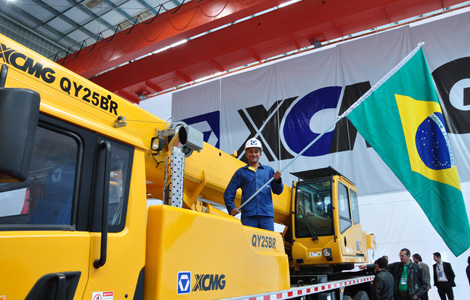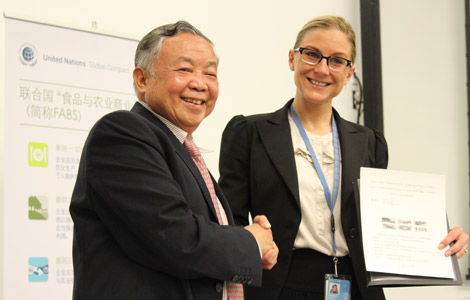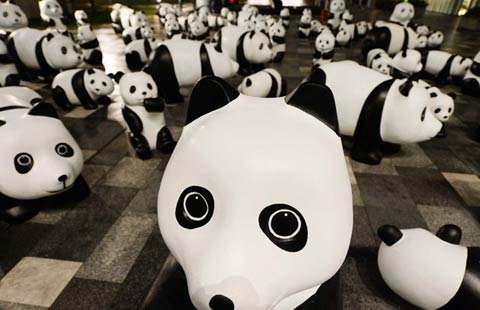'Blue guards' shore up ocean conservation
Updated: 2014-06-08 22:31
(Xinhua)
|
||||||||
SANYA, Hainan - In blue uniforms, a group of young people were busy picking up litter along the Dadonghai Bay in the southern Chinese city of Sanya as the coastal resort embraces the World Ocean Day on Sunday.
These ocean-loving "smurfs" are volunteers from the Blue Ocean Protection Association (BOPA), China's largest and most influential non-governmental organization (NGO) dedicated to ocean conservation.
Within less than seven years, organizers of the BOPA, also known as the "Blue Ribbon," have helped promote the idea of environmental protection to over millions of people across China through more than 400 public ocean-conservation activities they initiated.
"The ocean is the origin of life and protecting it is equal to protecting ourselves," said Sun Dong, co-founder and chairman of "Blue Ribbon," which was established in 2007.
The 42-year-old Shannxi businessman, who doubles as the general manager of a famous local sight-seeing spot, came to Sanya, Hainan Province 16 years ago. Impressed by the crystalline blue sea, Sun decided to move to the seaside and started his tourism business here.
"When I came here, the beaches were covered with Kadsura pepper stems and Pandanus tectorius trees that shielded windstorms and fastened sand, but nowadays there are very few left," Sun said, blaming the environmental degradation on the past decade of break-neck tourism development.
But that is just a small part of a broader picture that depicts China's threatened marine environment. According to a research report on China's ocean environment released in March by the State Oceanic Association (SOA), about 15 percent of China's offshore waters is heavily polluted, and 18,000 square km waters has fallen victim to heavy eutrophication.
"It is urgent to take action to curb marine pollution and restore the ecosystems," said Luo Jiuru, a retired researcher from the SOA and a consultant to the "Blue Ribbon."
The 79-year-old researcher settled down in Sanya in 2003 after retirement and devoted herself to ocean conservation as she found the over-development of the coastline and the swarming of tourists contributed to ocean pollution and disrupted their original ecosystems.
"I came to Hainan 40 years ago, there were plenty of sea gulls and flying fishes then, but now I barely see them," Luo added.
As urgency for change mounts, a great number of people in swathes of the country are taking actions by joining organizations such as the "Blue Ribbon" to save the oceans.
According to the NGO, over 5,000 people from 17 colleges and 46 enterprises across the nation have registered as regular volunteers and so far more than 20,000 people have participated in ocean-conservation activities it organized, particularly on holidays that see huge inflow of tourists in Sanya.
"Almost all volunteers I saw were tanned due to the scorching sun, but I feel encouraged when I see more parents are joining our campaign with their children to protect the ocean," said Zhang Jianghua, a senior volunteer of the "Blue Ribbon", in review of past activities in Sanya.
Despite rapid development and growing influence, Sun is still a little concerned about the organization's future development, as the cash-strapped NGO now faces a shortage of regular employees amid ever-increasing workload.
"More government and enterprise support will be helpful, and the steady introduction of societal capital into the charity sector in China may help ease pressure on NGOs more effectively," Sun said, citing international NGO operation experiences.
"I hope that 'Blue Ribbon' will go beyond Hainan to be a national ocean guard and gradually go global to help tackle environmental woes," Sun added.

 XCMG's new factory debuts in Brazil
XCMG's new factory debuts in Brazil
 Virginia's governor bids to expand China business ties
Virginia's governor bids to expand China business ties
 Portuguese language training helps Chinese in Brazil
Portuguese language training helps Chinese in Brazil
 Western leaders mark D-Day landings on Normandy beaches
Western leaders mark D-Day landings on Normandy beaches
 The Silk Road rediscovered
The Silk Road rediscovered
 Chinese firms seek partners in Virginia
Chinese firms seek partners in Virginia
 Company signs UN business principles
Company signs UN business principles
 Asian youths get a day of science, math, innovation
Asian youths get a day of science, math, innovation
Most Viewed
Editor's Picks

|

|

|

|

|

|
Today's Top News
Bergdahl says he was tortured by Taliban captors
Exports rebound in May, tough days ahead
'Blue guards' shore up ocean conservation
Top court vows to enhance transparency
Chinese hungry for Buffet's lunch auction
US opens patent probe into toner cartridges
Accused Seattle gunman suffers mental illness
Another US citizen held in DPRK
US Weekly

|

|







